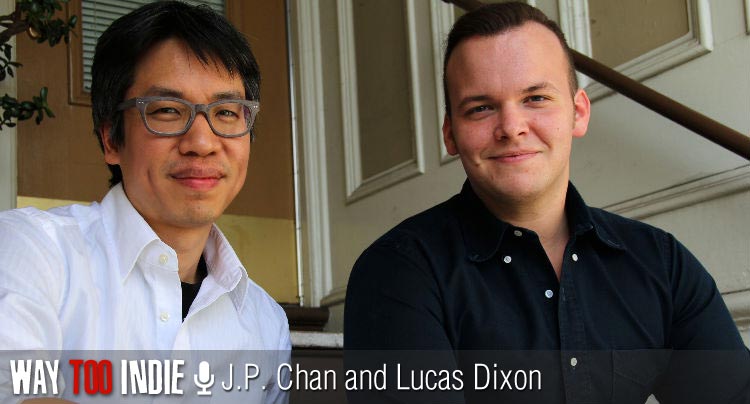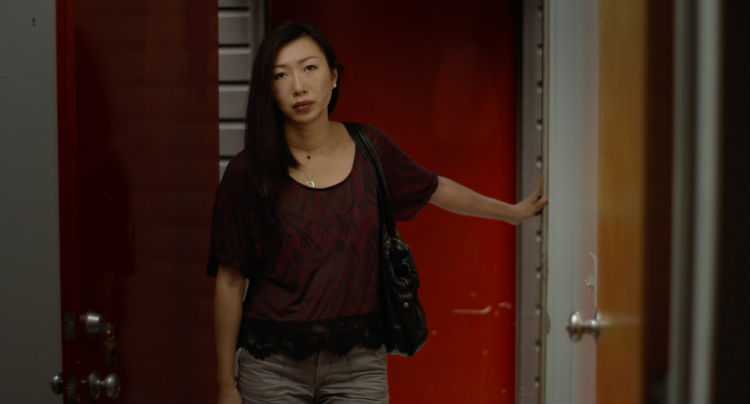J.P. Chan and Cast Talk ‘A Picture of You’ (Part 2)

In A Picture of You, a brother and sister (Andrew Pang and Jo Mei) return to their rural childhood home in Pennsylvania to sort through their recently deceased mother’s belongings. They discover shocking photos that change their perception of their mother (Jodi Long) entirely. The siblings process and reckon with the startling discovery in radically different ways, and together they venture down the rocky road toward the truth, clashing the whole way. The film also stars Teyonah Parris and Lucas Dixon.
More refined than your typical domestic drama, A Picture of You transcends the label of “Asian Film”, portraying its protagonists as siblings, flawed souls, and emotionally textured human beings, a treasure in today’s movie industry, which typecasts Asian Americans rampantly. The film is funny, well-written, relatable, and at times gut-wrenching, and director J.P. Chan exhibits an impressive measure of finesse in his debut feature.
In Part 2 of our interview with Chan, Lucas Dixon weighs in on the film, as with us the two discuss learning that our parents were as confused as us, older folks being freed of life constraints, the film’s visual style, defining the film’s genre, the influence of I Love You Phillip Morris, and more.
Lucas, I asked the rest of the cast this question: Can you remember a time you found a picture of your parents you hadn’t seen before and how it affected you?
Lucas: Of course. Seeing my parents from their young, newlywed days is strange, like they’re complete strangers, but it’s also really sweet. Those are the kind of pictures I’ve seen of my parents.
I have this thing, like a lot of people, where it’s very difficult for me to imagine my parents as anything but responsible adults. They were kids, but I can’t wrap my head around that.
JP: That’s something I’m much more well aware of as I get older. It shatters the idea that you get to a certain point in life and you figure everything out. You just plateau, living your life as an adult. That certainly hasn’t happened for me. That point where I figure it out just always seems further and further down the road. Maybe it’ll never come. By the time my mother was the age I am now, she had been divorced, been through a bankruptcy, been through a foreclosure. She was a single, working class mom with two kids, working as a waitress to stay alive. Then, she found a new home with her new husband and us. She wasn’t even my age, and she’d done all this. She was still trying to figure herself out, also. I think we’re all winging it.
Lucas: My dad is ten years older than my mom, and he was her high school physics teacher. They got married as soon as she turned 18. I’m 28, so imagining myself marrying an 18-year-old at this point in my life is hard.
I don’t want to spoil anything for our readers, but we learn with the main characters that their mom was involved in a relationship that’s pretty progressive as far as American society is concerned. We could have learned any number of things about the mom–what compelled you to write the revelation in this way?
JP: Part of it was that I wanted them to find something about the mother that really turned their world upside-down. The last thing they’d want to learn as they’re grieving for her. There’s also a lot of comic potential involved in that. The other part of it is that I’d heard these kinds of stories from people before, how they would find polaroids of their dad in a book shelf of him with an old girlfriend or something.
Part of me wanted to write another movie about the old folks in the movie, what their life was like before she died. As I get older, I think about how much of the constraints in your life are ones you create for yourself. I was trying to envision a time where, I’m like that old guy in the street who doesn’t give a fuck about being polite in the supermarket line. He’s slightly off, but in some ways he’s uninhibited and free from all these constraints. I was envisioning this world where they had this freedom to live the life that they choose.

The aesthetic of the film doesn’t go for that antiqued, oldie style so many nostalgia indies are painted with. Your film is clean and vibrant, not golden. In the flashbacks of the mom, there’s a dark ring around the image.
JP: The idea behind that came from wanting to portray the flashbacks in a way that was very vivid, like a strong memory, and yet, you don’t know everything that happened around that memory. It’s almost a visual metaphor, how there were things left out from that memory, and the kids find out that there’s a lot they didn’t know about their mom. I think a big inspiration for that visual tool was the old Fiona Apple video for Criminal.
If I were to ask you to put this film in a genre, what would it be?
JP: Ooh…I hate the word “dramedy”. I go back and forth. Is it a drama with funny stuff, or a comedy with dramatic stuff? I think it’s more of a drama with funny stuff.
Lucas: I feel like the draw of the movie, what makes it unique, is its genre, but that genre is hard to define. There are two vastly different chapters in the movie that both feel like their own genres.
JP: I’m cutting the trailer right now, and I’m having a lot of trouble because I have no idea what part of the movie to emphasize.
How about if I put it this way: This film is for lovers of what? What kind of filmgoer would you suggest it to?
JP: It’s a smart, honest movie that doesn’t have a lot of flash to it. It’s a very adult movie, respectful of life and life’s challenges. But also, you have to be playful in life, and life can be funny. There has to be a glimmer of hope that keeps you going. My aspiration for this movie is that, when you’re feeling really terrible, you can kind of curl up with it and feel like you’re not alone.
I freaking love I Love You Phillip Morris. I feel like it’s kind of close to this film. There are so many highs and lows in that movie, with hilarious comedy and serious drama. I love it. It’s full of surprises, and I hope this movie is full of surprises as well.
Lucas: I think the modern day audience likes to know what they’re getting into; I’m going to this movie to cry, I’m going into this movie to laugh. I like art that can give me a very unexpected experience. It might be a very polarizing experience for me, where I’m grieving and then laughing the next moment. That’s the human experience.
